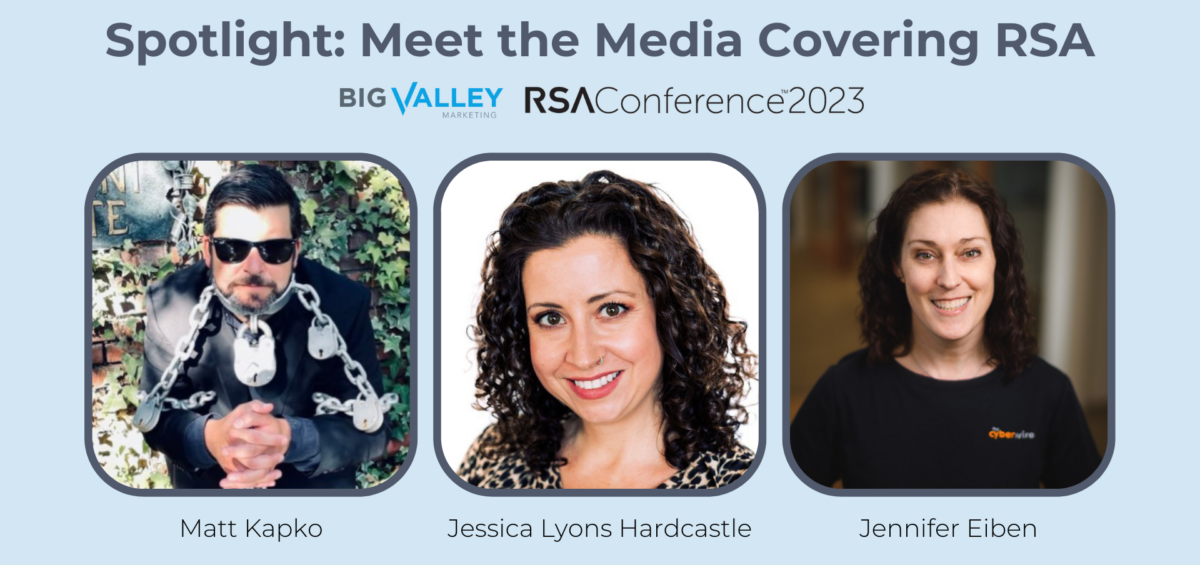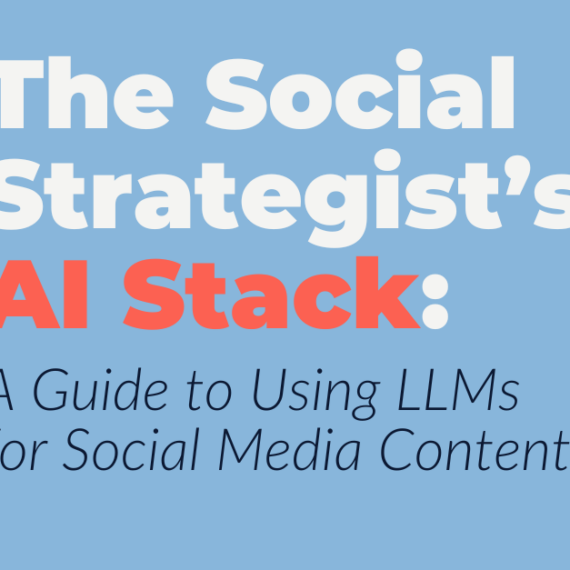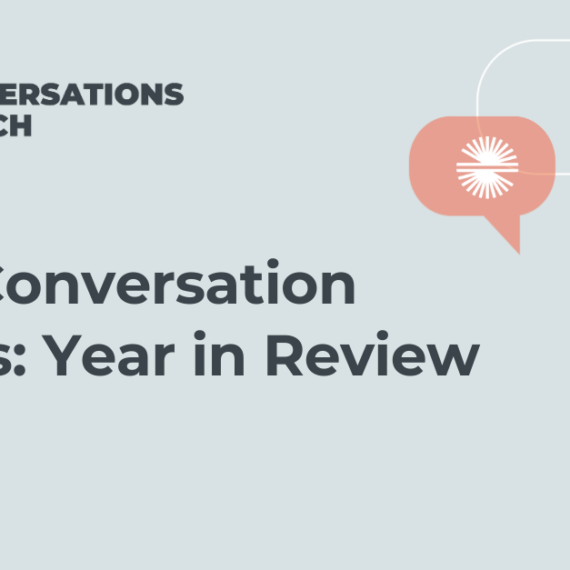By Big Valley Media + Influencer Leads Andy Shane and Josh Swarz
Spotlight: Meet the Media Covering RSA
With the RSA Conference fast approaching, we thought it would be fun and insightful to ‘turn the tables’ on some of the journalists we work with on a daily basis – to ask them some questions, and shed some light on their world.
Matt Kapko, who has more than two decades of journalism experience, is a reporter at Cybersecurity Dive. Jessica Lyons Hardcastle has also been a reporter for more than two decades and is currently the Cybersecurity Editor for Situation Publishing, publishers of The Register, The Next Platform, Blocks & Files, and DevClass. Jennifer Eiben is a Senior Producer at Cyberwire, where she produces all of CyberWire’s more than 20 podcasts.
As we gear up for another week at the Moscone Center, we dove headfirst into the world of security – exploring how the beat has evolved since these journalists started reporting, and what advice they have to offer future generations. Enjoy!
How did you arrive at your current position?
MK: Industry Dive has tremendous respect in the media industry. For years I’ve admired its ability to break the media business mold. My previous employers often referenced Industry Dive as the type of company they looked up to and aspired to become. That made an impression on me. Industry Dive produces meaningful journalism, and it’s a successful business — not an easy feat.
When I first met my colleagues, I quickly recognized how the company would challenge me to be my best. It’s incredibly rare to find a team with such talent spread across more than 100 journalists, and I jumped at the opportunity.
JLH: The opportunity to work with (and learn from) world-class journalists, especially Editor-in-Chief Chris Williams, who broke the Intel-Meltdown bug story, and security maven Iain Thompson, and reach a global audience of 40+ million readers.
JE: I came to the CyberWire by a very circuitous route. I started with a cybersecurity company to help with their philanthropic efforts, and my role grew to include events and the founding of the Women in Cybersecurity event. When the CyberWire split off from that company, we took the events portion with us, and that is how I ended up in the cybersecurity media field.
Why did you choose cybersecurity? Or did the beat find you?
MK: Cybersecurity is a fascinating and complicated beat of tremendous importance. It’s front page news almost every day, unfortunately, because things have gone horribly wrong. Everyone is talking about it and trying to make sense of the digital threats we face at work, in our personal lives, and in society at large.
There are no dull moments on this beat. The stress and real-world implications are profound, and many in the cybersecurity space are rather defeatist about the outlook or at least resigned to the fact that risk is spreading and getting worse. Despite all that, there’s a widespread sense of optimism among those fighting against the odds to make things better.
JLH: It found me. I thought it sounded fun and interesting (it is), and at the time, none of the other reporters wanted to cover it. I am SO glad they didn’t.
JE: I did not choose cybersecurity; I happened into it.
How has reporting on cybersecurity changed throughout your career?
MK: Cybersecurity is one of the hottest spaces around today, but that’s a relatively recent development. The industry and practice used to be more relegated to the sidelines, but as threats and exposure increased, interest has grown significantly.
The elevation of cybersecurity today reminds of the mid-2000s when the mobile industry emerged from the shadows and gained top billing at the world’s most influential companies. Cybersecurity, like everything technology touches, is intersecting with more industries and becoming defined by software and cloud-based infrastructure.
JLH: It has changed in that a non-biz audience has at least somewhat of an understanding about what cybersecurity is; i.e., now my relatives think I have a cool job because they know what ransomware is and have heard of SolarWinds (as in the hacking of). Also, it’s not just an isolated piece of technology — I think the industry as a whole now realizes that cybersecurity touches every part of tech, and society as a whole, so that means that every story, from the SVB collapse to ChatGPT to the war in Ukraine has a cybersecurity angle to it.
JE: My main focus is in podcast production and the stories we tell in cybersecurity, of course, have changed, but there are many of the same actors and many of the same types of threats out there. We try to shine a light on these stories in a way that helps our audiences sort through all of the noise out there in the industry.
Heading into this year’s RSA, what are you looking forward to the most/what are you hoping to accomplish?
MK: RSA is the most important event of the year in the cybersecurity space. My goal, as always, is to make connections with the smartest and most inspiring people there, soak up everything I can and come away with a solid understanding of the trends we’ll be focusing on for the rest of the year.
JLH: I’m looking forward to moderating my very-first RSA panel this year. I’m also very anxious about that. It’s “Running in the Shadows,” on Monday. I’m also looking forward to seeing people in person. I’m hoping to not over-schedule myself so I actually have time to write, and I’m looking forward to writing the kind of in-depth, interview-based stories that only happen when you talk in person at these events, not over a Zoom or phone call.
JE: I am looking forward to attending in person. I have not been at RSAC since the pandemic started in 2020 (when it was all starting there in San Francisco). I look forward to connecting with others in our industry, specifically women in cybersecurity as that is my passion.
What advice would you share with up and coming journalists interested in pursuing a career in cybersecurity journalism?
MK: Find your passion, pursue it with vigor, and don’t let the bastards get you down. Journalism is a volatile industry and career path, but full of meaning and smart people. We don’t always get to choose our beats, but curiosity, kindness, and the courage to stick with this profession for more than 20 years have served me well.
Industries or topics that interest you most will shine through in your reporting and grow over time. Don’t be afraid to take risks and leave jobs that no longer challenge you or fulfill your passion.
JLH: You don’t have to have a technical background to do it. And if you like learning new things every day and covering stories and topics with far-reaching effects like the Ukraine war, ransomware threats on hospitals and critical supply chains, and data privacy, then you are in the right place.
JE: I would recommend listening to the CyberWire Daily podcast to hear the latest news and learn about the cybersecurity industry. That is how I did it! Apart from shameless promotion, I’d say go for it. There are plenty of great people in the industry looking to share their stories and are willing to help others get a leg up. Cybersecurity is a great community, and there are those of us like me who have been in it for many years and are always willing to help create connections.
# # #
We want to thank Matt, Jessica and Jen for taking the time to answer our questions. To explore other insights from tech journalists, take a listen to the Pressing Matters podcast, from Big Valley Marketing. Pressing Matters features conversations with the top influencers in B2B technology. From Fortt Knox to Audible, the journalists we interview on this podcast have been there for all of it – and they have thoughts on where things are going, whether you’re interested in humans, chips, cybercrime, or long-necked lutes.






